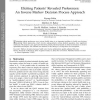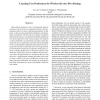5 search results - page 1 / 1 » Eliciting Patients' Revealed Preferences: An Inverse Markov ... |
109
Voted
DA
2010
14 years 11 months ago
2010
. Direct approaches, which involve asking patients various abstract questions, have significant drawbacks. We propose a new approach that infers patient preferences based on observ...
127
Voted
IJCAI
2007
15 years 3 months ago
2007
Inverse Reinforcement Learning (IRL) is the problem of learning the reward function underlying a Markov Decision Process given the dynamics of the system and the behaviour of an e...
135
click to vote
ATAL
2004
Springer
15 years 7 months ago
2004
Springer
The problem of interest is how to dynamically allocate wireless access services in a competitive market which implements a take-it-or-leave-it allocation mechanism. In this paper ...
128
click to vote
RECSYS
2009
ACM
15 years 8 months ago
2009
ACM
Current conversational recommender systems are unable to offer guarantees on the quality of their recommendations due to a lack of principled user utility models. We develop an ap...
111
click to vote
AVI
2008
15 years 4 months ago
2008
The development of intelligent assistants has largely benefited from the adoption of decision-theoretic (DT) approaches that enable an agent to reason and account for the uncertai...


